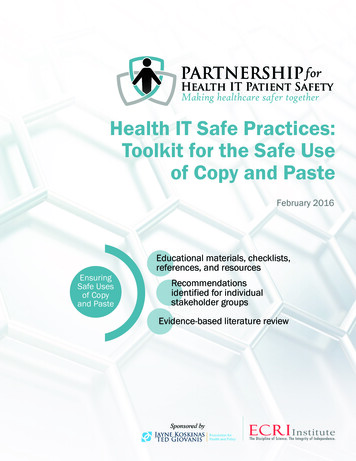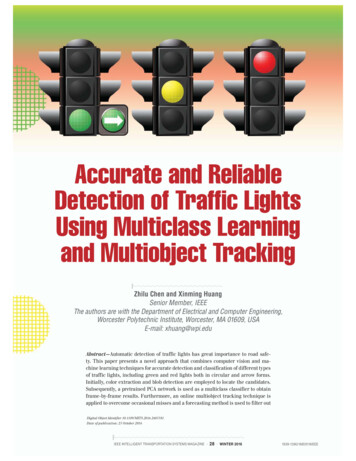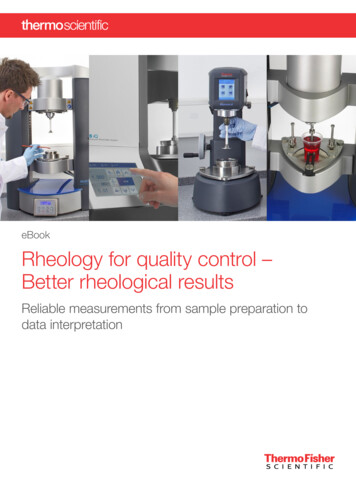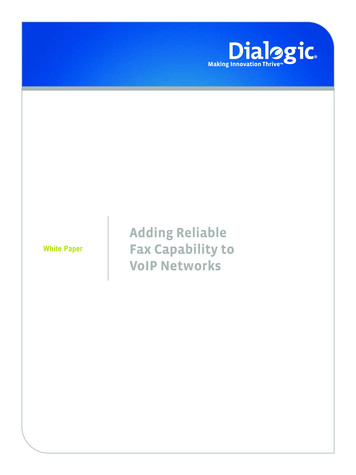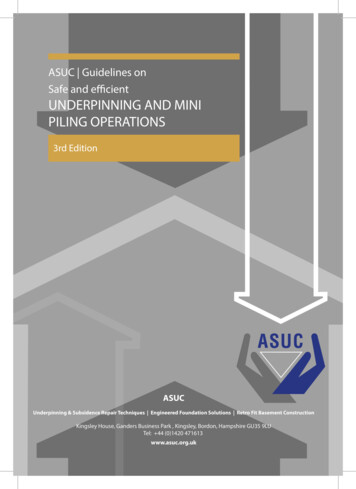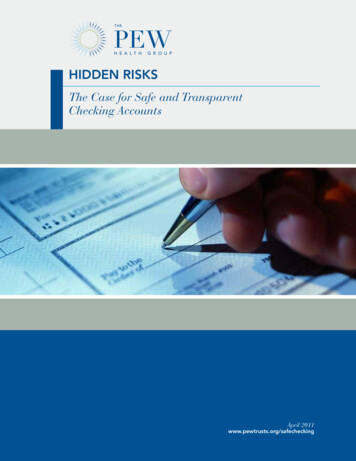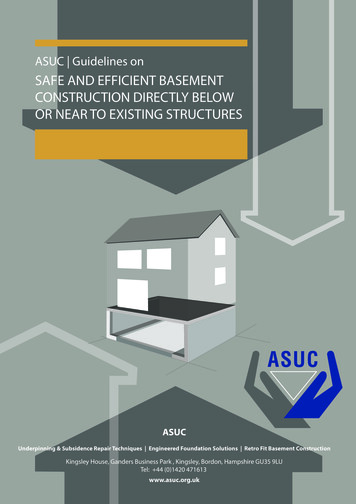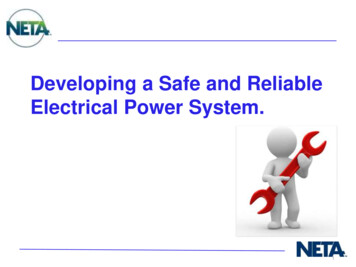
Transcription
Developing a Safe and ReliableElectrical Power System.1
Topics for Today Who is NETA?What are the ANSI/NETA Standards?Specifying a NETA Accredited CompanyHow can builders, contractors, architects andengineers ensure safety and reliability inelectrical power system installations? What should an electrical preventivemaintenance program look like?
What is NETA?
NETA is an association of electricaltesting companies that is committed toadvancing the industry’s standards forpower system installation andmaintenance to ensure the highestlevel of electrical reliability and safety.
The InterNational Testing Association Member Companies US, Canada, Puerto Rico,Chile and Brussels Approximately 1,500 Certified Technicians Approximately 1,100 individual Affiliates International Associate subscriptions includerepresentatives from over 60 countries includingColumbia, India, Thailand, Hong Kong, Finland,Saudi Arabia, Sweden, Greece, England, Australia,Cuba, Mexico and many more
NETA MissionThe mission of the International ElectricalTesting Association is to serve theelectrical testing industry by: Establishing standards Publishing specifications Accrediting independent, third-party,electrical testing companies Certifying test technicians
NETA MissionThe Association also: Collects and disseminates information anddata of value to the electrical industry Educates the public and end user about themerits of electrical acceptance andmaintenance testing
InterNational Electrical TestingAssociationNETA has been an Accredited StandardsDeveloper for the American NationalStandards Institute (ANSI) since 1996.ANSI recognizes NETA’s industryleadership through: ANSI/NETA ETT-2010 ANSI/NETA ATS-2009 ANSI/NETA MTS-2011
InterNational Electrical TestingAssociation Accreditation of third-party, independentelectrical testing companies Certification of electrical testingtechnicians 40 YEARS of on going support andeducation of NETA members, theirtechnicians, and friends of NETA
NETA Education Tools NETA World JournalNETA Handbooks – 14 VolumesSPTS – Self Paced Technical SeminarsOnline CoursesPowerTest ConferenceNETA Affiliate Program
What areANSI/NETA Standards?
ANSI/NETA StandardsThe ANSI/NETA Standards address: Standards for Acceptance Testing Standards for Maintenance Testing Standards for Certification of Electrical TestingTechnicians
ANSI/NETA StandardsThe Scope of the ANSI/NETA Standards isdifferent from that of the IEEE, NECA,NEMA, and UL.– In matters of testing electrical equipment andsystems NETA Standards are morecomprehensive. They reference other standardsdevelopers’ documents where applicable.– NETA's review and updating of presentlypublished standards takes into account bothnational and international standards.
ANSI/NETA StandardsThe Scope of the ANSI/NETA Standardsis different from that of the IEEE, NECA,NEMA, and UL. (cont.)– NETA’s standards may be used internationallyas well as in the United States.– NETA firmly endorses a global standardization.– IEC standards as well as American consensusstandards are taken into consideration byNETA's section panels and reviewingcommittees.
ANSI/NETA ATS-2009ANSI/NETA Standard forAcceptance TestingSpecifications for ElectricalPower Equipment and Systems Developed for assessing the suitability for initialenergization of electrical power equipment andsystems. Specifies field tests and inspections that ensurethese systems and apparatus performsatisfactorily, minimizing downtime andmaximizing life expectancy. Should always be referenced in designspecifications or when performing acceptancetesting on power system installations.
ANSI/NETA MTS-2011ANSI/NETA Standard for MaintenanceTesting Specifications for ElectricalPower Equipment and Systems - NewEdition Developed for use by those responsible for thecontinued operation of existing electricalsystems and equipment. Provides a guide in specifying and performingthe necessary tests to ensure that thesesystems and apparatus perform satisfactorily,thus minimizing downtime and maximizing lifeexpectancy. Should always be referenced when writingmaintenance specifications or performingroutine testing on electrical power systems.
ANSI/NETA ETT-2010ANSI/NETA Standard forCertification of Electrical TestingTechnicians Developed to provide a standard forcertification of electrical testingtechnicians. Created to codify the experience,education, and training requirementsnecessary for an individual to obtain alevel of competency as an electrical testtechnician.
Why Specify a NETAAccredited Company ?(NAC)
NETA Accredited CompaniesNETA’s accreditation process carefully examines thequalifications of each NETA Accredited Company(NAC) in addition to certifying the individual technicianemployed by that NAC.Accredited Company Certified Technician Quality
NETA Accredited CompaniesNETA – NAC’s Unique Qualifications1. NETA CERTIFIED TECHNICIAN – Field Experience,Training, and Continuing Education2. SAFETY – Setting the Standard3. THIRD-PARTY, INDEPENDENT TESTING4. QUALITY ASSURANCE5. TOTAL SYSTEM EXPERIENCE – Total SystemService
NETA Certified Technicians Trained on NETA TestingStandards Technical Knowledge FieldExperience Broad-based Continuing EducationRequirements Backed by NETA AccreditedCompany Meets ANSI/NETA ETT
Safety Assurance Industry leaders in safework practices Trained in complex safetyassessment Compliant with NETA andAll Industry Related SafetyRequirements
NAC TestingThird-Party Independent Unbiased Evaluation
Quality Assurance NAC Corporate Infrastructure Calibration Program Report Parameters PE Reviewed Reports Continued Education andTraining Leading Technology
Total System ExperienceAll voltages, all manufacturers: Transformers Switchgear and CBs Power Cable Relaying ProtectionFrom incoming service to the mechanical load
Why Test
Why TestDo you believe an electrical system: Must be designed and engineered properly. Quality equipment should be procured. It should be installed to all applicable codesand standards by qualified installingcontractors and vendors. Verification of all above should be performedthrough an independent, third – partyinspection process.27
Why TestBut often projects fall victim to thefollowing: Poorly written specifications & contracts Lack of understanding with respect to designand application of electrical equipment Budget & time constraints Unqualified contractors & installers Use of unaccredited testing & commissioningcontractors28
Why TestVerify electrical & mechanical integrity as wellas the functional performance of theelectrical systemElectrical acceptance testing helpsdetermine: If the newly-installed equipment is safe to operate Components and installation are in conformancewith drawings and specifications Provides base-line testing results That the equipment will function properly on alltaps and settings29
Why TestThird party testing offered by anunbiased and qualified entity providesan overall assessment of the system,based and national consensusstandards and technical certifications.30
TechnicianQualifications
Total System ExperienceNETA recognizes four levels ofcompetency in the electricaltesting industry32
QualificationsLevel I – Trainee Technician Entry level to two years. Typical activities include:–Simple assistance.–Simple measurements–Test equipment set up and put away–Cleaning33
QualificationsLevel II – Assistant Technician Two years minimum experience,education. Must pass qualifying examination. Typical activities include:– Assists– Inspects– Tests– Data collection– Test for de-energized locked out/tagged outequipment34
QualificationsLevel III – Certified Technician Five years’ minimum experience,education. Must pass qualifying examination. Typical activities include:– Lockout/tagout, safety grounding– Test for de-energized medium-voltageequipment– Performs moderately complex tasks– Interacts with other skills and operations35
QualificationsLevel IV – Certified Senior Technician Ten years’ minimum experience,education. Pass qualifying examination. Typical activities include:– Test for de-energized high-voltageequipment.– Corrects system failures.– Performs very complex tests.– Interacts with engineers and managers.36
How Can You HelpEnsure Safety and Reliability?
Ensure Safety and ReliabilityBid Specifications Should Include: Acceptance testing of all electrical equipment andsystems Testing in accordance with the most recentANSI/NETA ATS standard Testing Performed by a NETA Accredited Company(NAC) and NETA Certified Technicians A list of local NACs
MASTERSPEC
NETA Standards ReferenceANSI/NETA StandardsReference:Division 01 – General RequirementsDivision 11 – EquipmentDivision 21 – Fire SuppressionDivision 26 – ElectricalDivision 28 – Electronic Safety andSecurityDivision 33 – Utilities
MASTERSPEC - PART 1 GENERALMASTERSPEC – Part 1Current ReferenceDOES:Provide a general referenceto testing agency andtesting technicianqualifications.DOES NOT:Specify compliance with theANSI/NETA ATS Standard.
Part 1Prequalification Statement1.5 QUALITY ASSURANCEA. Electrical Power Equipment and Systems: Tested as specified by the ANSI/NETA Standard for Acceptance Testing Specifications forElectrical Power Equipment and Systems and defined in Sections 3 – 11, by a NETA Accredited Company or equivalent third-party,independent testing agency which can function as an unbiased testing authority, professionally independent of the manufacturers,suppliers, and installers of equipment or systems being evaluated.Test technicians shall be certified in accordance with ANSI/NETA ETT-2010 Standard for Certification of Electrical Testing Technicians. Each on-sitecrew leader shall hold a current certification, Level III or higher, in electrical testing.B. Qualification of Testing Organization: In accordance with Section 3.1 of the ANSI/NETA Standard for Acceptance Testing Specificationsfor Electrical Power Equipment and Systems1. The testing organization shall be an independent, third party entity which can function as an unbiased testing authority,professionally independent of the manufacturers, suppliers, and installers of equipment or systems being evaluated.2. The testing organization shall be regularly engaged in the testing of electrical equipment devices, installations, and systems.3. The testing organization shall use technicians who are regularly employed for testing services.4. An organization having a designation of “NETA Accredited Company” issued by the InterNational Electrical Testing Associationmeets the above criteria.5. The testing organization shall submit appropriate documentation to demonstrate that it satisfactorily complies with theserequirements.C.The testing organization in accordance with Section 4.2 of the ANSI/NETA Standard for Acceptance Testing Specifications forElectrical Power Equipment and Systems shall provide the following:1.All field technical services, tooling, equipment, instrumentation, and technical supervision to perform such tests and inspections.2.Specific power requirements for test equipment.3.Notification to the owner’s representative prior to commencement of any testing.4.A timely notification of any system, material, or workmanship that is found deficient based on the results of the acceptance tests.5.A written record of all tests and a final report.D.Safety and Precautions practices shall be in accordance with Section 5.1 of the ANSI/NETA Standard for Acceptance TestingSpecifications for Electrical Power Equipment and Systems
Specify Acceptance Testing1.5 QUALITY ASSURANCEA. Electrical Power Equipment and Systems:Tested as specified by the ANSI/NETAStandard for Acceptance TestingSpecifications for Electrical Power Equipmentand Systems and defined in Sections 3 – 11
Specify Testing by a NACA. by a NETA Accredited Company, or anequivalent, third-party, independent testingagency which can function as an unbiasedtesting authority, professionally independent ofthe manufacturers, suppliers and installers ofequipment or systems being evaluated.
Specify Testing Agency QualificationsB. Qualification of Testing Organization: In accordance with Section3.1 of the ANSI/NETA Standard for Acceptance TestingSpecifications for Electrical Power Equipment and Systems1. The testing organization shall be an independent, third party entity which canfunction as an unbiased testing authority, professionally independent of themanufacturers, suppliers, and installers of equipment or systems being evaluated.2. The testing organization shall be regularly engaged in the testing of electricalequipment devices, installations, and systems.3. The testing organization shall use technicians who are regularly employed fortesting services.4. An organization having a designation of “NETA Accredited Company” issued bythe InterNational Electrical Testing Association meets the above criteria.5. The testing organization shall submit appropriate documentation to demonstratethat it satisfactorily complies with these requirements.
Specify NETA Certified Technicians Test technicians shall be certified in accordancewith ANSI/NETA ETT-2010 Standard forCertification of Electrical Testing Technicians. Each on-site crew leader shall hold a currentcertification, Level III or higher, in electricaltesting.
Specify Technician QualificationsC. The testing organization in accordance with Section 4.2 of the ANSI/NETAStandard for Acceptance Testing Specifications for Electrical PowerEquipment and Systems shall provide the following:1. All field technical services, tooling, equipment, instrumentation, and technical supervision toperform such tests and inspections.2. Specific power requirements for test equipment.3. Notification to the owner’s representative prior to c
–NETA’s standards may be used internationally as well as in the United States. –NETA firmly endorses a global standardization. –IEC standards as well as American consensus standards are taken into consideration by NETA's section panels and reviewing committees. ANSI/NETA ATS-2009 ANSI/NETA Standard for Acceptance Testing Specifications for Electrical Power Equipment and Systems .File Size: 1MBPage Count: 70
